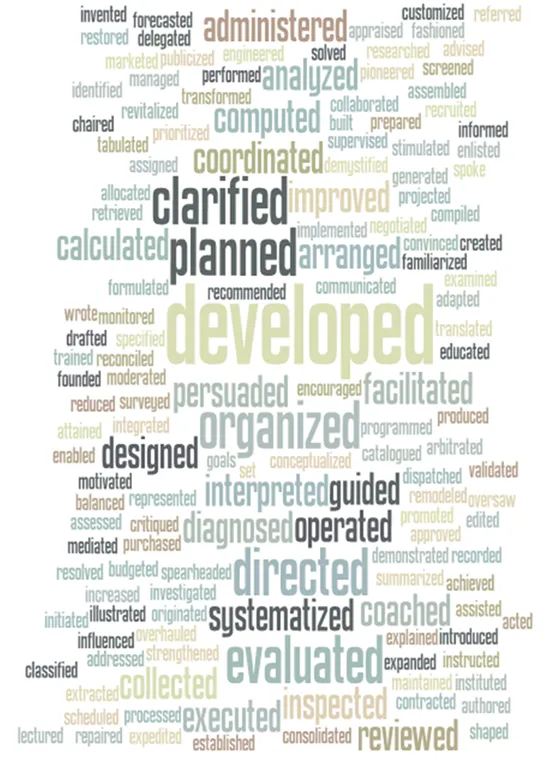Why Action Words Matter in Cover Letters
In the competitive landscape of job applications, a cover letter serves as your first impression. It’s your chance to showcase your skills, experience, and personality to potential employers. Among the many elements that contribute to a compelling cover letter, the use of action words is paramount. Action words, also known as power verbs, breathe life into your accomplishments, demonstrating not just what you did but how you did it and the impact you made. They transform passive descriptions into dynamic narratives, grabbing the reader’s attention and making your application stand out from the crowd. Without them, your cover letter might fall flat, failing to convey the value you bring to the table. Therefore, understanding and effectively utilizing action words is a crucial skill for anyone seeking employment.
Grabbing Attention with Strong Action Words
Strong action words are the secret weapon for captivating the reader’s attention. They quickly and effectively communicate your capabilities and accomplishments, transforming a bland list of responsibilities into a compelling story of success. Rather than simply stating your tasks, action words show what you achieved and how you achieved it. For example, instead of writing “Responsible for managing social media,” you could use “Managed and grew social media presence by 30% in six months.” This small change instantly makes your experience more impactful. Effective action words paint a vivid picture of your skills and expertise, making you appear proactive, results-oriented, and a valuable asset to any organization. They act as key indicators of your professional potential and signal to employers that you are the kind of candidate who gets things done.
Demonstrating Skills and Achievements
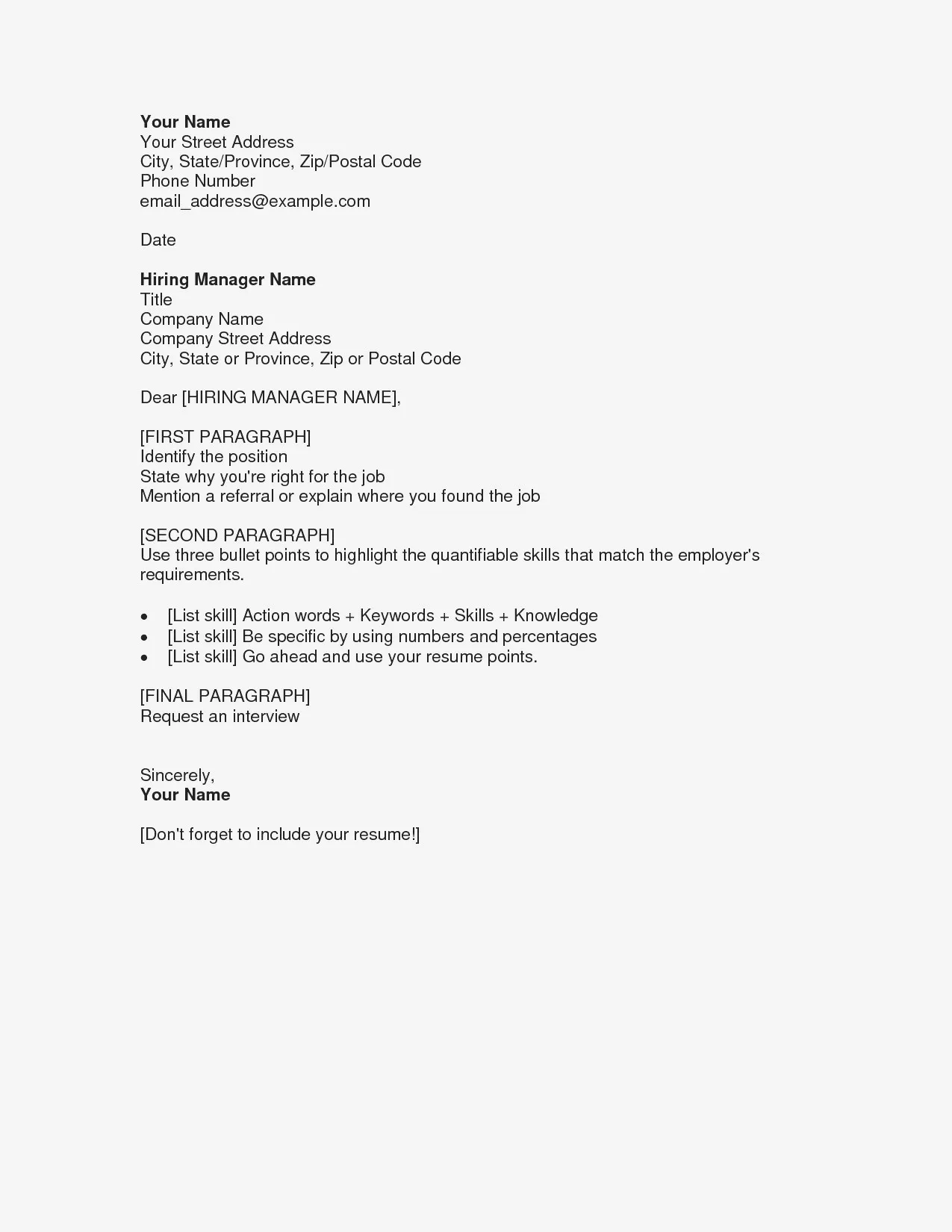
The primary purpose of a cover letter is to showcase your skills and achievements. Action words are instrumental in achieving this by clearly illustrating how you utilized your skills to produce tangible results. Instead of merely listing your skills, you can use action words to demonstrate how you applied them in past roles. For instance, if you’re highlighting your leadership abilities, you might use action words like “Led,” “Directed,” “Managed,” and “Mentored” to describe your experience. Similarly, if you want to show your problem-solving skills, consider using words like “Resolved,” “Analyzed,” “Devised,” and “Implemented.” These words highlight not only what you did but also the positive outcomes you achieved, making it easy for the employer to understand your value. They transform your resume from a static summary to a dynamic and persuasive argument for your candidacy.
Highlighting Relevant Experience
When crafting your cover letter, it is crucial to focus on the experience most relevant to the job you are applying for. Action words help you tailor your cover letter to the specific requirements of each position, enabling you to draw a direct line between your skills and the employer’s needs. Before writing, carefully review the job description, paying close attention to the keywords and skills the employer seeks. Then, weave those keywords into your cover letter using powerful action verbs. For example, if a job description mentions “project management,” you should use action words like “Coordinated,” “Organized,” “Executed,” and “Delivered” to showcase your relevant experience. This targeted approach demonstrates that you understand the role and have the specific skills the employer is looking for. It shows that you have not just held similar roles but can also apply your expertise to meet their needs.
Tailoring Action Words to the Job
One of the most effective strategies for making your cover letter stand out is tailoring your action words to the specific job you are applying for. This involves carefully analyzing the job description to identify the key skills and responsibilities the employer is seeking. Once you understand these requirements, you can strategically select action words that highlight your relevant experience and demonstrate how your skills align with the job’s demands. For instance, if the job description emphasizes teamwork, you might use words like “Collaborated,” “Facilitated,” and “Teamed.” If the job requires strong analytical skills, consider action words such as “Analyzed,” “Evaluated,” and “Interpreted.” By using language that resonates with the employer, you increase the likelihood of capturing their attention and showcasing your ability to meet their specific needs.
Researching Industry-Specific Action Words
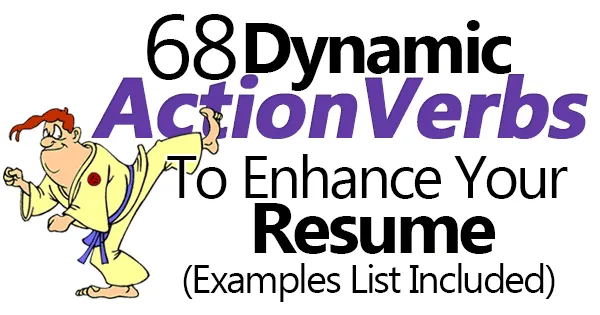
To truly impress, research the industry-specific action words. Each field has its unique jargon and preferred terminology, and using the right words demonstrates that you are familiar with the industry’s language and nuances. This attention to detail can significantly enhance your credibility and show potential employers that you are not only skilled but also knowledgeable and prepared. For example, in the marketing field, words like “Launched,” “Optimized,” and “Conceptualized” are common. In the tech industry, verbs like “Developed,” “Implemented,” and “Debugged” are frequently used. Look at job descriptions, industry publications, and websites related to your target field to identify the most relevant action words. Incorporating these into your cover letter will help you speak the language of the industry and instantly make your application more persuasive.
Common Action Words and Their Impact
Understanding the impact of different action words is crucial for crafting a compelling cover letter. Some action words are more powerful than others, and the choices you make can significantly alter the perception of your skills and accomplishments. For instance, verbs like “Achieved,” “Exceeded,” and “Surpassed” convey a sense of exceptional performance, while words like “Managed,” “Led,” and “Directed” highlight leadership capabilities. Words such as “Created,” “Developed,” and “Designed” emphasize innovation and creativity. When selecting your action words, consider the specific accomplishments you want to highlight and choose the verbs that best represent your actions and the resulting impact. Tailoring these verbs to the specific needs of each job allows you to further strengthen your application and draw the employer’s attention to what matters most.
Action Words for Leadership
Showcasing your leadership abilities is vital in many job applications. Using action words that highlight your ability to lead and influence others can significantly boost your chances of success. Verbs like “Led,” “Directed,” “Managed,” and “Oversaw” demonstrate your experience in guiding teams and projects. Words such as “Mentored,” “Coached,” and “Guided” showcase your ability to develop and support others. By using these action words, you can effectively communicate your capacity to motivate teams, set goals, and achieve results. Include concrete examples of your leadership skills, detailing projects you led, teams you managed, and the outcomes you achieved. This evidence will allow the employer to visualize your leadership experience and recognize your potential.
Action Words for Problem-Solving
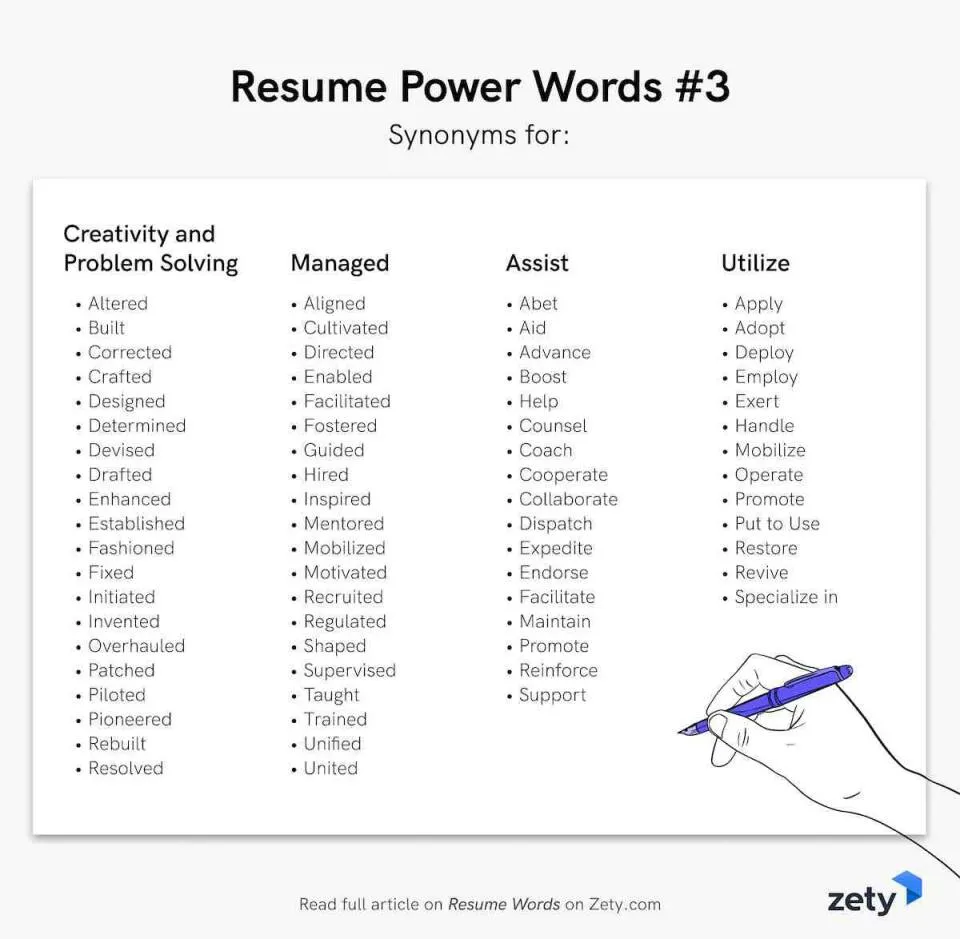
Employers often seek candidates with strong problem-solving abilities. Highlight your problem-solving skills using powerful action words. Verbs such as “Analyzed,” “Resolved,” “Identified,” and “Investigated” demonstrate your capacity to dissect problems and find effective solutions. Use words such as “Devised,” “Implemented,” and “Executed” to showcase your skills in developing and putting solutions into practice. When describing your problem-solving experiences, provide specific examples of the challenges you faced, the steps you took to address them, and the results you achieved. This approach proves your ability to think critically, find solutions, and make a positive impact. It shows that you’re a proactive and capable problem-solver.
Action Words for Teamwork and Collaboration
Teamwork and collaboration skills are highly valued by employers. Highlighting these skills in your cover letter can significantly increase your chances of getting noticed. Utilize action words that demonstrate your ability to work effectively with others. Verbs like “Collaborated,” “Facilitated,” “Cooperated,” and “Partnered” convey your capacity to work successfully within teams. Use words such as “Communicated,” “Negotiated,” and “Mediated” to showcase your abilities to communicate and resolve conflicts. Provide examples of team projects where you successfully worked with others to achieve common goals. By demonstrating your teamwork and collaboration skills, you highlight your ability to contribute to a positive and productive work environment.
Action Words for Communication
Effective communication is a critical skill in any workplace. To showcase your communication abilities, use action words that highlight your ability to convey information clearly and persuasively. Verbs like “Communicated,” “Presented,” “Wrote,” and “Articulated” demonstrate your capacity to convey ideas and information effectively. Use words such as “Negotiated,” “Persuaded,” and “Advocated” to demonstrate your abilities to influence others. Provide examples of situations where you successfully communicated complex information to different audiences, such as presentations, reports, or client interactions. Highlighting your communication skills will demonstrate your ability to build relationships, foster understanding, and effectively convey your ideas.
Avoiding Overused Action Words
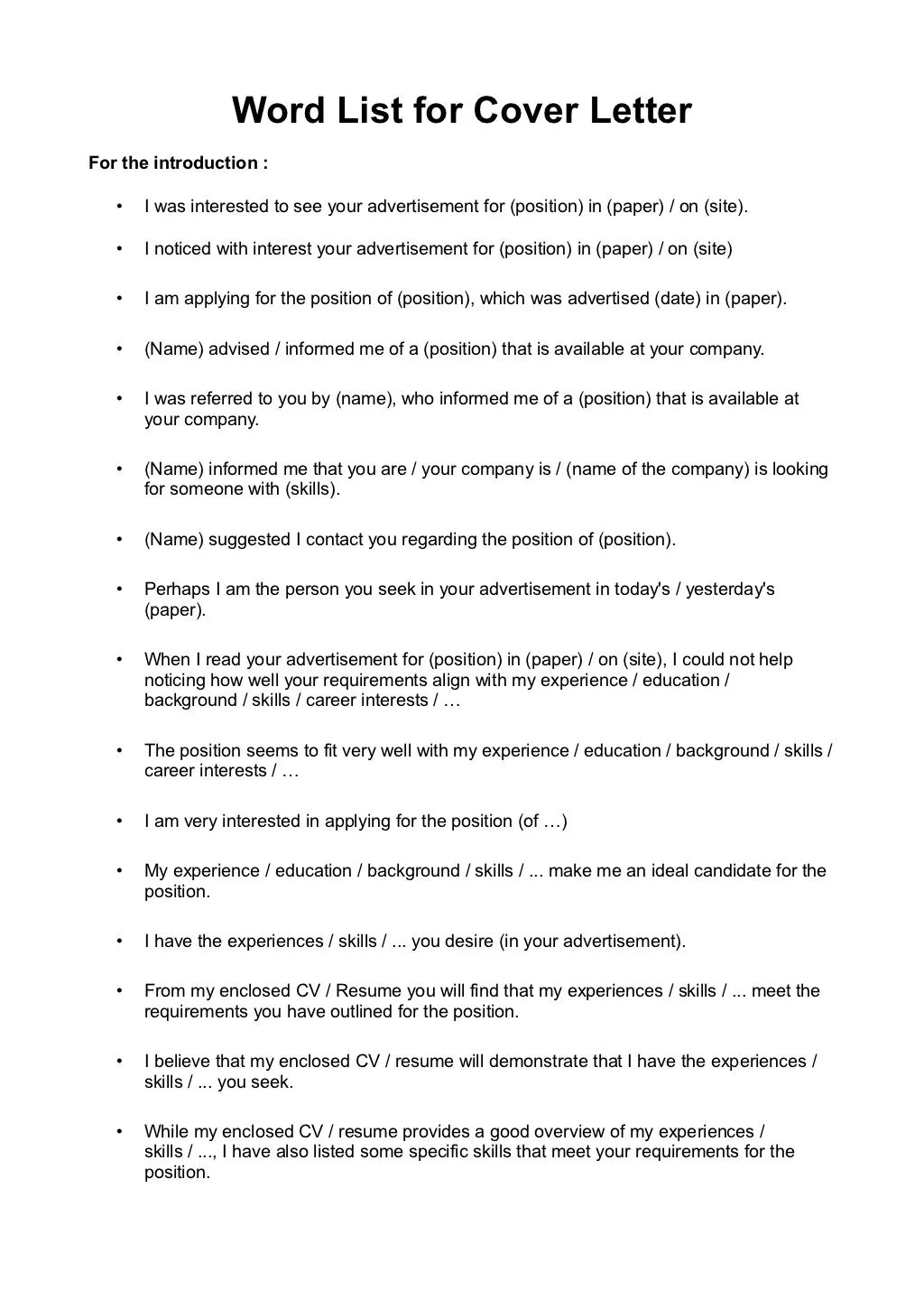
While using action words is important, it’s equally crucial to avoid overused and generic verbs that might make your cover letter seem cliché. Words like “Responsible for,” “Assisted,” and “Helped” are common but often lack impact. They don’t clearly demonstrate your actions or achievements. Instead, opt for more specific and compelling action words that provide a clearer picture of your skills and accomplishments. For example, instead of “Responsible for managing social media,” consider “Managed and grew social media presence by 30% in six months.” Using more specific and impactful verbs will make your cover letter more engaging and memorable, setting you apart from other applicants.
Using Action Words Effectively
To use action words effectively, consider the context and the specific accomplishments you wish to highlight. Focus on providing evidence of your actions and the results you achieved. Always quantify your achievements whenever possible; this adds credibility to your claims. For instance, instead of writing “Improved customer satisfaction,” write “Improved customer satisfaction scores by 15% through implementing a new feedback system.” Make your language concise and active, avoiding passive voice and ambiguous phrases. Use a variety of action words to showcase a range of skills and experiences, demonstrating your versatility and adaptability. Regularly review and refine your cover letter to ensure that your action words are impactful and relevant to the jobs you’re targeting.
Quantifying Achievements with Action Words
Quantifying your achievements using action words is a powerful way to make your cover letter more compelling and demonstrate the tangible impact you have had in past roles. Adding numbers and metrics provides concrete evidence of your success. Instead of merely stating your achievements, use numbers to illustrate the extent of your accomplishments. For example, instead of “Increased sales,” say “Increased sales by 20% in one quarter.” Quantifying your achievements helps potential employers to understand the value you bring. When describing your achievements, always include relevant data, statistics, or percentages to showcase the positive results of your actions. This approach makes your cover letter more credible and showcases your potential to drive similar results in the new role.
Showcasing Results and Impact
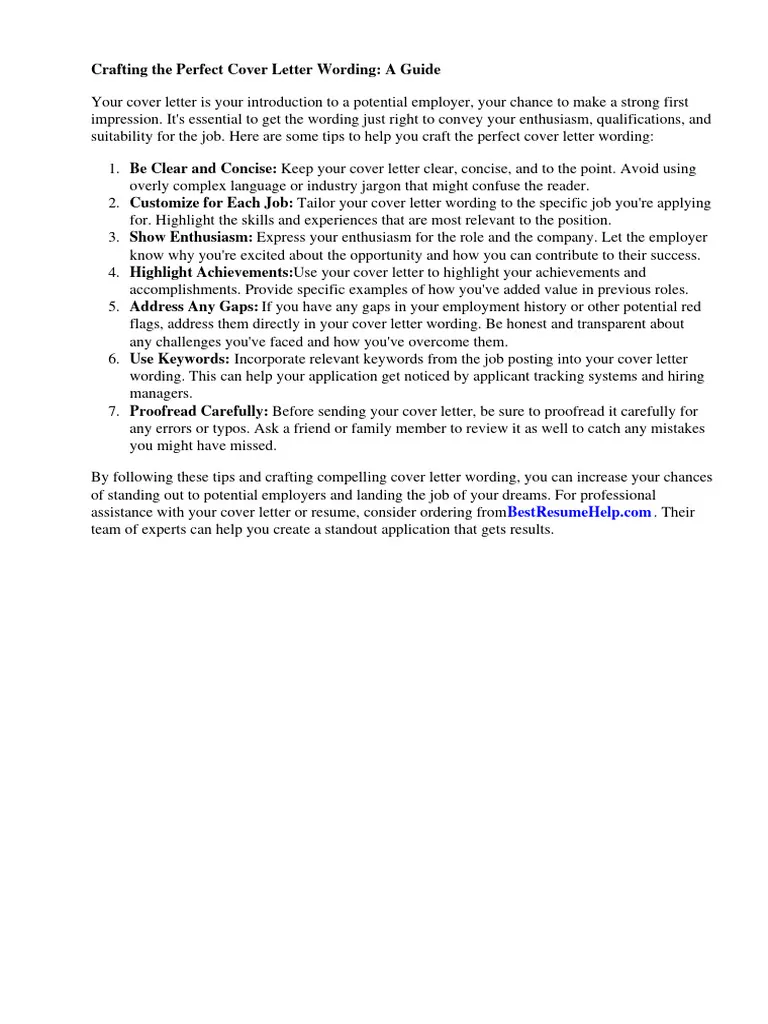
The ultimate goal of your cover letter is to showcase your ability to achieve results and make an impact. Action words are essential for communicating your achievements and their outcomes. Frame your accomplishments to show not just what you did but the effects of your actions. When describing your experience, emphasize the impact you made on your previous employers. For instance, if you streamlined a process, mention how it resulted in increased efficiency or cost savings. If you improved customer satisfaction, specify the increase in positive reviews or repeat business. By highlighting the results of your actions, you demonstrate that you are a results-oriented individual with a proven track record of success. This approach enhances your value and increases your chances of securing an interview.
Formatting and Placement of Action Words
The formatting and placement of action words also plays a crucial role in the effectiveness of your cover letter. Action words should be integrated naturally into your sentences, making them flow smoothly and easily readable. Always begin your bullet points or statements with strong action verbs. This immediately draws the reader’s attention to your key accomplishments. Use a variety of action words to showcase different skills and experiences, but avoid repeating the same verbs excessively. Varying your word choice makes your cover letter more engaging and prevents it from sounding repetitive. Ensure that your use of action words is consistent throughout the document, and the action words align with the specific requirements of the job.
Integrating Action Words Seamlessly
The seamless integration of action words is crucial for a cover letter that reads well and highlights your skills. Avoid using action words in a way that feels forced or awkward. Instead, integrate them naturally into your descriptions of your experience and accomplishments. The goal is to tell a story that grabs the reader’s attention and shows how you can address the employer’s needs. Make sure your action words are grammatically correct and used in the correct tense. For example, use past tense verbs when describing past experiences. When using action words, always follow up with clear evidence of what you have achieved. Proper integration allows your cover letter to create a compelling narrative that effectively highlights your qualifications and demonstrates your potential.
Reviewing and Refining Your Cover Letter
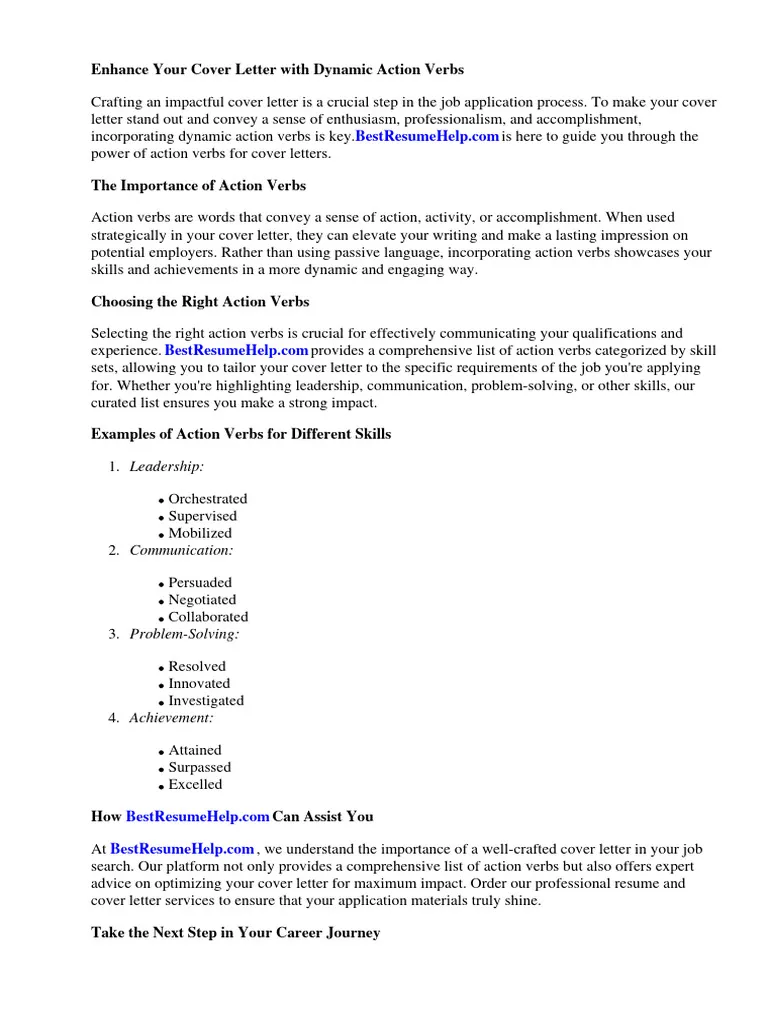
Once you’ve written your cover letter, it’s essential to review and refine your writing. Check for errors, ensuring your action words are accurate and impactful. Read through your cover letter to make sure the language is clear, concise, and easy to understand. Verify that you’ve used a variety of action words to showcase your skills and experiences. Ensure that your cover letter directly addresses the specific requirements of the job. Get feedback from trusted sources, such as career counselors or friends, who can provide a fresh perspective on your writing. Revising and refining your cover letter is a crucial step in creating a persuasive document that increases your chances of success.
Proofreading for Impact
After refining the content and integrating action words, the final step is proofreading. Ensure your cover letter is free of grammatical errors, typos, and inconsistencies. These can undermine your credibility and distract from your message. Review every sentence and every word with care. Also, read your cover letter aloud. This can help you catch errors you might miss when reading silently. Use grammar and spell-checking tools, but always double-check their suggestions. The goal is to present a polished, professional document that reflects your attention to detail and writing skills. Proofreading demonstrates your commitment to excellence, helping your application stand out and make a positive impression on potential employers.
